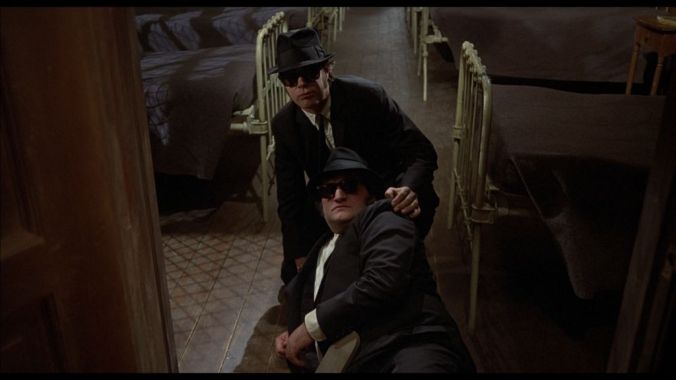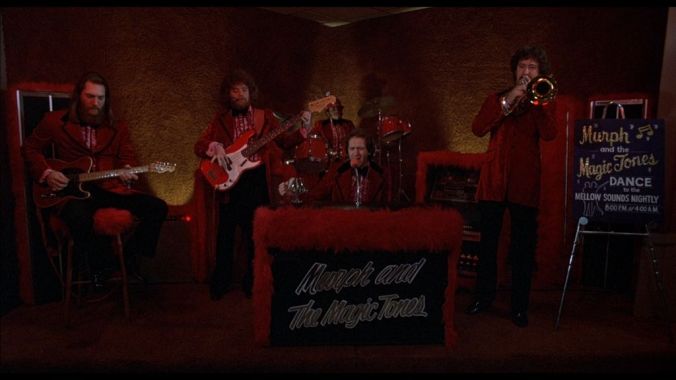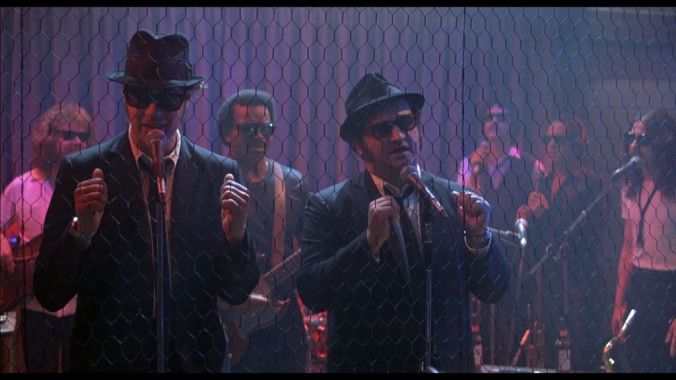The Blues Brothers (1980)
Dir. John Landis
Written by: John Landis and Dan Akroyd
Starring: John Belushi, Dan Aykroyd, Carrie Fisher, Cab Calloway
When I was very young, I often felt like I was out of step with my peers. My interests didn’t line up with theirs and I rarely participated in the fashions and trends that the other kids at my elementary school were obsessed with. My mother made most of my clothes and she cut my hair in a Lennon-esque shaggy bowl cut until I was about 10 or 11 years old. When other kids my age were getting into sports, I was reading tomes about the history of the Civil War and writing my own short stories on my family’s ancient word processor. This isn’t to say that I didn’t have plenty of commonalities with my classmates; I was as into Cool Runnings and The Mighty Ducks as any American kid was in 1993, and I was an avid video gamer, cherishing the Super Nintendo that my sister and I received as a Christmas gift in 1992, even though we originally played it on a black-and-white television. I did have friends, and good ones, at that, but even amongst friends, I felt that some of my interests were outside of the norm. While my friends started getting into contemporary pop culture, borrowing rap albums from older siblings or sneaking into the room to watch the ending of a scary movie, my tastes stayed decidedly retro. Until the time her turntable broke in 1993 or 1994, my main source of music came from my mother’s record collection. My sister and I had kids’ tapes that we’d listen to in the car, but we weren’t allowed to watch MTV until a little later, so our only source of “adult music” was from these three dozen or so records kept on a shelf, collected from the late 1960s into the 80s. We listened to Rubber Soul and Dylan’s Greatest Hits, but it was the copy of Briefcase Full of Blues, the debut album by The Blues Brothers that most intrigued me.

I don’t remember the exact first time I put that record on the turntable, and dropped the needle to hear the walking bassline of “I Can’t Turn You Loose” played by Donald Duck Dunne and the tight but raucous horn stabs from “Blue” Lou Marini and “Bones” Malone, but I do remember the impact that the record had on me. This was something far afield from the folk music I was most familiar with from her collection. This was party music. It was loud and celebratory, but it also had an edge that made it feel dangerous. There was something mysterious to me about the image of the Blues Brothers on the cover; their black hats and suits, and matching dark Ray Bans were the epitome of cool to nine-year-old me. I knew that the group was something of a novelty act, music being performed by comedians, but it didn’t matter. I knew Aykroyd well from having seen Ghostbusters roughly 100 times to that point, and I was aware that there was a movie called The Blues Brothers, but I was introduced to the group first through the music. To me, the Blues Brothers were a band, not characters from a sketch or a film, and they were the coolest people in the world. Seeing the movie around the time I was 12, long after the turntable was kaput and I was no longer able to hear the music, did nothing to diminish that image in my mind. On the contrary, it cemented their status as cool guy role models for a young kid who was still a couple years away from discovering punk rock.
The Blues Brothers expanded on the sense of raucous fun I got from listening to the record, and it gave the titular group a back story and an insane world in which to live. For the uninitiated, the plot is very simple. The film opens with “Joliet” Jake Blues (Belushi) being released from prison. His brother, Elwood (Aykroyd), picks him up in a decommissioned police cruiser that he bought after trading in the “Bluesmobile” for a microphone. Soon after, they visit the Catholic orphanage in which they were raised and find out that the orphanage owes $5,000 for a tax assessment or it will be closed. The Blues Brothers take it as their “mission from God” to raise the $5,000 and save the orphanage. They have to figure out a legitimate way to raise the money, so they decide to reassemble their backing band for a big performance that will help them raise the money. They meet some initial resistance, but they ultimately get everyone to agree to the gig, however, there are other roadblocks in their way as they are being pursued by Jake’s jilted ex-lover (Fisher), the Illinois Nazi party, a rival country band, and a cadre of law enforcement, up to and including the United States Army. The Blues Brothers is the rare musical comedy that succeeds in providing both great musical set pieces and genuinely funny scenes. It enlists a who’s who of Blues and R&B legends to join with The Blues Brothers for unforgettable musical cameos, as well as cameos by established and up-and-coming comedic actors. The Blues Brothers is a big, exciting blockbuster of a comedy and it ranks up as one of my favorites in the genre and potentially my very favorite musical.

Much of the movie’s comedic success comes from the natural chemistry between Aykroyd and Belushi, and their combined charisma as performers. After years of performing together on SNL and after having taken their Blues Brothers act on the road, the two had honed their onstage personae to a razor sharp point. Their characters are perfect foils for one another. Belushi’s Jake is the larger than life, bellicose frontman of the band, while Aykroyd’s Elwood is the more stoically reserved sidekick. Their interplay is perfect and they bounce off of one another with aplomb, each one filling in the gaps of the other’s personality. Elwood doesn’t have a tremendous amount of dialogue in the film, but Aykroyd’s line delivery never fails to crack me up. He has a clipped, Joe Friday delivery that implies a level of simplicity belied by the mechanical ingenuity that Elwood often shows throughout the film. Aykroyd embodies Elwood with a sense of natural cool. He doesn’t say much because he doesn’t have to; he lets his persona do the talking for him. However, as good as Aykroyd’s performance is, it can’t match the scene-stealing force that is John Belushi as “Joliet” Jake Blues.
The Blues Brothers is Belushi at his unhinged best, dancing, jiving, and shouting his way through the film with no shame. If he gained mega-stardom through his portrayal of the dumb brute Bluto in Animal House, he showed off his full range in The Blues Brothers, using his physicality in both predictable and surprising ways. Belushi is a force of nature in the film, staggering and swaggering, but also unexpectedly lithe and graceful, showing off a great deal of athleticism as he dances and cartwheels his way through the performance scenes. Unlike Bluto, Jake is the brains of the operation, and as such, Belushi is given a great deal more dialogue to work with. Jake is lecherous and scheming, but he’s also good-hearted and devoted to his brother and their surrogate father from the orphanage, Clarence (Calloway). Belushi’s passionate performance in The Blues Brothers makes me wonder what he would have gone on to do had he lived just a little bit longer and made a few more films. This film was his first big opportunity to showcase his range as a performer, and, sadly, he would be dead less than two years after its release.

While the stars of the film do a good bit of the heavy comedic lifting, their task is lessened by the hilarious odd ball world that Aykroyd and Landis’s script envisions for them to inhabit. The Blues Brothers is absolutely a celebration of the city of Chicago, but its version of Chicago is viewed through a fun house mirror. Like a handful of the other comedies that I’ve written about here, The Blues Brothers feels like it’s taking place in a world that is just adjacent to our own. This probably shouldn’t be surprising as more than most other genres, musicals require audiences to totally suspend their disbelief to accept a world in which the characters will break out in song in public at the drop of a hat, giving even the most “realistic” musicals a sense of artificiality. The world of The Blues Brothers is madcap and wacky, involving high speed car chases that employ impossible physics in their cinematic ballet of destruction, vengeful white supremacists and country groups, and a bazooka wielding ex. Jake and Elwood are repeatedly wrecked, blown up, and shot at in the film, and manage to take it all in stride and come out on the other side with nary a scratch. But beyond its larger scale weirdness, The Blues Brothers is simply packed with small, memorable moments that are patently absurd that form its distinctive comedic tone. From the brothers’ standard lunch order (four whole friend chickens and a Coke for Jake, dry white toast for Elwood), to the repeated impetus of their quest (“We’re on a mission from God”), Jake and Elwood have a magical, charmed quality about them that informs the whole film with a sense of lightheartedness. The weird, goofiness of the world of the movie underscores the absurdity of its stone-faced protagonists.
Fleshing out this strange world are a cast of characters comprised of some of the period’s best rising comedic stars. Carrie Fisher’s role as Jake’s unnamed jilted bride, who is hell bent on hunting he and Elwood down and killing them, leveling whole buildings in the process, is the only other role that I ever picture her in besides Princess Leia. She is a mysterious figure until near the film’s end, but her largely unexplained back story is hinted at by the glimpses that we get into her life. John Candy shows up as one of the detectives hunting down the Blues Brothers, and his ad-libbed “Orange whip” bit is one of my favorite lines from the whole film. Frank Oz has a brief cameo as the prison guard who returns Jake’s possessions to him when he is released from prison at the beginning of the film. But of course, the supporting roles that steal the show are the musicians who make cameos throughout the film. James Brown, Aretha Franklin, Ray Charles, and John Lee Hooker all make appearances, alongside other famous blues and R&B musicians of the 1950s and 60s. Aretha’s performance of “Think” in the soul food restaurant is my favorite in the film, but the scene featuring James Brown’s portrayal of Rev. Cleophus James never fails to illicit a smile with its over-the-top choreography. Ray Charles’s performance of “Shake a Tail Feather” along with the Blues Brothers Band is the film’s central showpiece. The film’s final performance is great, but it doesn’t match the energy of the band really getting into a great dance number, alongside one of the greatest pianists of all time, with hundreds of extras dancing in the Chicago streets.

Obviously, I have little but kind words for The Blues Brothers, but it does have a few technical shortcomings, some of which are glaring, such as “Blue” Lou’s saxophone solo during “Think.” The moment that Lou struts down the counter of the soul food restaurant during his solo should be his shining moment in the film, but unfortunately, he is framed from the neck down with his face not appearing in the shot. Landis isn’t the most visually innovative filmmaker, and I can forgive some of his more minor technical mistakes, simply because most of the film is shot very well. The car chase scenes are big and exciting, and, at the time, the film set a record for most automobiles destroyed during filming (a record that would later be broken by its sequel). Landis is able to balance these bigger scenes of spectacle with the smaller moments that provide the film its humor, and he successfully creates the rare musical comedy that nails both the performative, spectacular elements of the musical and the subtlety of perfect comedy. At the time of its filming, The Blues Brothers was one of the most expensive comedies ever filmed, and the pressure was on Landis and the film’s stars to deliver a hit. The film was a box office success, more than recouping its budget and actually grossing slightly higher box office in foreign markets than in the U.S., which was a rarity at the time. Although it wasn’t a smash hit, the film would go on to grow long legs in the emerging home video and cable television markets, earning itself new fans into perpetuity.

I’ve seen The Blues Brothers so many times over the years that I can anticipate the jokes before they arrive, and I watch it with a permanent smile across my face, ready to break into a full laugh when the punch line hits. I think Belushi’s death shortly after the film’s release paints it in a slightly different light, but even if he had gone on to lead a long life and enjoy a storied career, I think that Jake Blues would still be remembered as his iconic performance. I do wonder how younger audiences respond to The Blues Brothers, without a more direct connection to its inspirations and its featured performers. Of its principal cast, only Aykroyd is still alive, and Aretha Franklin is the only living featured performer left. The film’s iconic Chicago setting is somewhat unfamiliar after 35 years of urban development. However, I think that the things that made me connect to the film and the music early on in life are universal. There’s inherent humor and cool in the line, “It’s 106 miles to Chicago, we’ve got a full tank of gas, half a pack of cigarettes, it’s dark, and we’re wearing sunglasses. Hit it.” The joy and beauty expressed in the film’s musical scenes ring true to any audience, and tap into a primal desire to dance, sing, and enjoy life. I think I love The Blues Brothers so much because it’s a celebration of so many of the things that I have come to love about life: humor, music, goofy black suits, stupid dance moves. It might look a little bit retro now, but for me, The Blues Brothers has never gone out of style, just like a black suit.